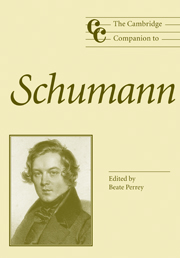3 - Schumann's heroes: Schubert, Beethoven, Bach
from Part I - Contexts
Published online by Cambridge University Press: 28 September 2011
Summary
In all Schumann’s compositions for the piano one can sense a constant striving for originality – originality of both form and content . . . One cannot fail to note the powerful, lasting impressions that the study of classical models, such as Sebastian Bach or Beethoven, made on Schumann; on occasion the listener can even identify more recent composers, for example, Franz Schubert, Felix Mendelssohn Bartholdy, or Chopin.
It goes almost without saying that one must speak, in this case, not of actual reminiscences or intentional, slavish imitation but rather of works created in a similar tone and a related spirit.
Carl KoßmalyAs a largely self-taught composer who for the first part of his career was equally if not more active as a critic, Schumann was intensely aware of his own and his contemporaries' historical moment. Studying Wilhelm Christian Müller's Aesthetisch-historische Einleitung in die Wissenschaft der Tonkunst around 1834, he would have encountered the view that the period 1800–30 marked the highpoint – indeed, the perfection (Vollendung) – of musical history. But for Schumann the past mattered above all to the extent that it paved the way for a future music that it was the duty of his generation to cultivate. In his editorial for the first 1835 issue of the Neue Zeitschrift für Musik (NZfM) he set out his critical position as being ‘to keep emphatically in mind the former age and its works, to draw attention to the fact that only at such a pure source can new artistic beauties be invigorated – and thereby to resist the immediate past as inartistic, bent only on the enhancement of superficial virtuosity – and finally to prepare and hasten the coming of a new poetic age’.
- Type
- Chapter
- Information
- The Cambridge Companion to Schumann , pp. 48 - 62Publisher: Cambridge University PressPrint publication year: 2007
- 2
- Cited by

